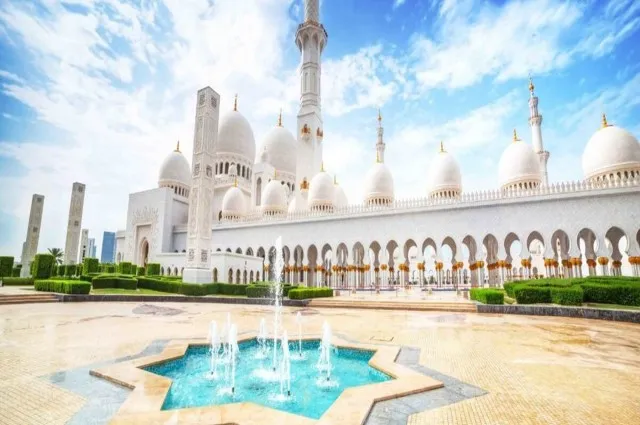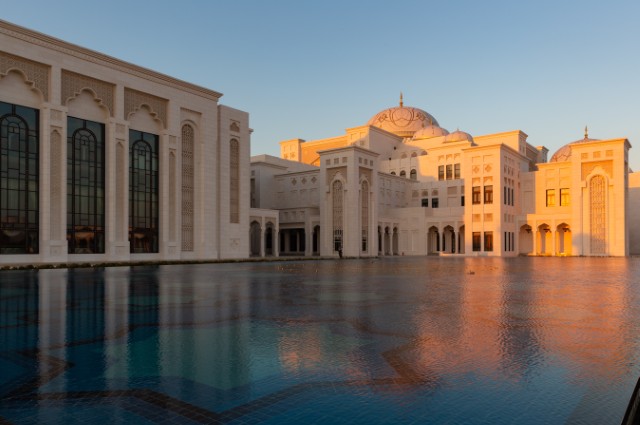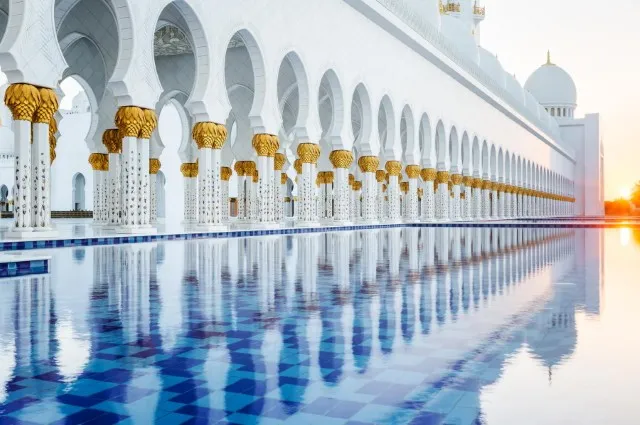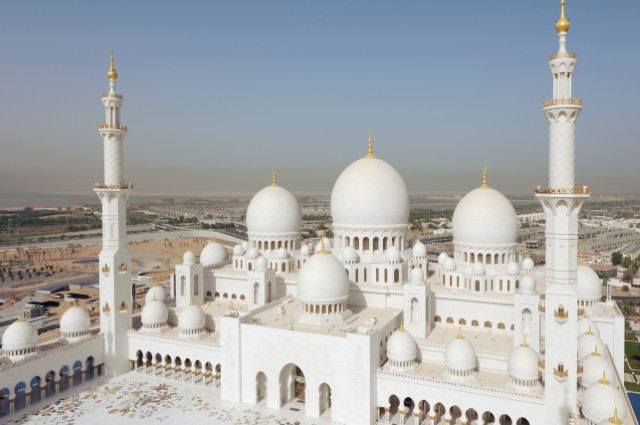Abu Dhabi Specialist Holidays Travel Agent
Get in touch with our Abu Dhabi specialist Jo today by email, contact form or by calling +44 (0)1580 712 690
Much like neighbouring Dubai, Abu Dhabi was heavily involved in pearl fishing and trade. When the pearling industry collapsed, partly due to the global depression and competition (e.g. cultured pearls), interest turned to oil. Exploration grew mid-20th century, and in 1958 Abu Dhabi made its first major oil discovery offshore at Umm Shaif; commercial oil exports began a few years later. Today, Abu Dhabi is the richest of the UAE emirates, controlling over 90% of UAE’s proven oil reserves and a significant amount of natural gas reserves as well.
However, there is a strong push now to diversify the economy away from reliance on hydrocarbons. Major investments are going into tourism, culture (museums, island developments), infrastructure, and other non-oil sectors.
If you visit Abu Dhabi, you’ll probably find it less overwhelming in pace and spectacle than Dubai, but there is massive growth underway, so the skyline and landscape are changing fast.
What to Do
Qasr Al Hosn
The oldest stone building in Abu Dhabi, Qasr Al Hosn was originally built as a watchtower by the Bani Yas tribes in the late 18th century using coral and sea stone. Over time, the fort was expanded into a palace and became home to the ruling family. In the 20th century it also served as the seat of government and national archives. After an extensive restoration, it reopened to the public in 2018 as a cultural landmark with a museum, exhibition spaces, and the House of Artisans, offering visitors a glimpse into Abu Dhabi’s past.Sheikh Zayed Grand Mosque
With 82 domes clad in gleaming white marble, the mosque dominates the skyline, while the interior dazzles with intricate mosaics, floral motifs, and colossal chandeliers decorated with Swarovski crystals. The main prayer hall is home to the world’s largest hand-knotted carpet, crafted by over 1,200 artisans. The mosque is not only a masterpiece of Islamic architecture but also a welcoming place of cultural exchange.Saadiyat Cultural District
Located on Saadiyat Island, the district is emerging as one of the world’s most ambitious cultural hubs. At its heart is the Louvre Abu Dhabi, which opened in 2017, and the Zayed National Museum, due to open later in 2025; future projects include the Natural History Museum Abu Dhabi, the Guggenheim Abu Dhabi. Adding a cutting-edge dimension, teamLab Phenomena will offer an immersive digital art experience, while the Abrahamic Family House brings together a mosque, church, and synagogue in a single complex designed to promote interfaith dialogue.Ferrari World
Located on Yas Island, Ferrari World remains one of the capital’s most popular attractions. Opened in 2010, the theme park is home to Formula Rossa, the world’s fastest roller coaster (for now), which accelerates to an incredible 240 km/h. Alongside the headline rides are family attractions, interactive exhibits, and plenty to engage both children and adults.Desert Adventures
No visit to the UAE would be complete without venturing into the desert, and Abu Dhabi offers a wide range of excursions. From half-day trips with dune bashing and camel riding to overnight desert camps where you can enjoy traditional Emirati hospitality under the stars, the experience provides a striking contrast to the modern city skyline.Abu Dhabi Heritage Village
For those interested in Emirati traditions, Abu Dhabi Heritage Village offers a reconstructed glimpse of life before oil. With a traditional souq, mosque, and fort, as well as artisans demonstrating age-old crafts, the village provides insight into pearl diving, fishing, and the simple desert life that sustained the community for centuries. A small museum houses artefacts that trace Abu Dhabi’s journey from a modest trading settlement to a global capital.Qasr Al Watan
While still used for official state functions, the presidential palace has been open to visitors since 2019. It showcases breathtaking Arabian craftsmanship, with intricately carved doors inlaid with 23-carat gold and a collection of rare manuscripts, artefacts, and diplomatic gifts reflect the heritage and international ties of the nation. Visitors can also enjoy the beautifully landscaped gardens, dining venues, and gift shop.Travel Advice
There are a number of things that you should be aware of when travelling to Abu Dhabi. We hope the following information will be helpful but it is to be used as a guide only.Entry Requirements
British citizens will be issued with a visitors visa on arrival into the UAE. The visa is valid for 30 days.Your passport should be valid for a minimum period of 6 months from the date of entry into the UAE. If you are transiting the UAE (and not passing through Immigration) your passport currently only needs to have a minimum of 3 months validity from the date of transit. Please note, children travelling to the UAE must now have their own separate passport.
For the most up to date information, please refer to the FCO travel advice website.
Medication
Travellers to the UAE should be aware that some over the counter medicines that are available in the UK are considered controlled substances in the UAE and are therefore not allowed to be brought into the country without prior permission from the UAE Ministry of Health. A list of controlled medicines and how to apply for permission can be found on the following website: Issue of Permit to Import Medicines for Personal UseWe would also advise you speak to your health professional for further advice.
Dress Code
You should be respectful of culture when travelling to the UAE. It is recommended that your shoulders and knees should be covered when in most public areas. In places of worship, such as mosques, men and women are required to cover their arms and bodies, and women must also cover their heads. Swimwear is allowed on the beach or by the pools within hotel grounds.Language and Religion
Arabic is the official language in the UAE with English being the language for business.Islam is the official religion. If you travel to the UAE during the month of Ramadan, please be aware that additional restrictions and observances may apply.
Twin Centre Holidays
Abu Dhabi's geographical location allows the traveller a wide range of opportunities to twin a stay here with many other destinations.The Indian Ocean is easily accessible with good services to the Maldives and Seychelles. Access to the other Emirates is also seamless with Dubai being only a 40 minute drive. Please contact us for ideas!
Abu Dhabi Holiday FAQs
When is the best time to visit Abu Dhabi?
The best time to visit is during the winter months from November to March, when daytime temperatures stay in the mid-20s and conditions are ideal for sightseeing, beach trips, and outdoor activities. Spring (April/May) and autumn (September/October) are also pleasant shoulder seasons, with rising or falling temperatures around 30°C and the chance of better hotel deals outside peak season.Summer (June through August) brings extreme heat, often topping 40°C, but this is also when you’ll find the lowest accommodation rates, making it a good budget option if you don’t mind the high temperatures and prefer indoor attractions.

.webp)










